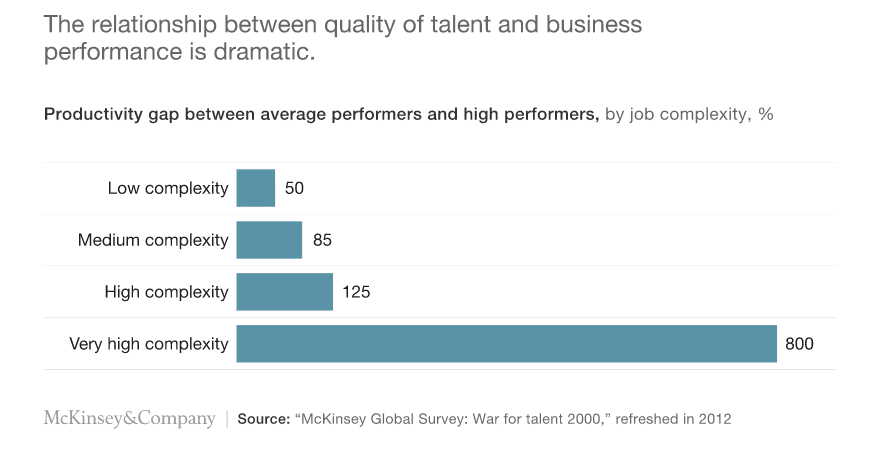Account managers are an integral part of your business and client retention process. They are the key players who have the ability to make your business irreplaceable to clients. But having the wrong person for the position can cost you and affect your business.
An estimated 72 percent of US employers said that they’re having a hard time finding skilled candidates. Add to this the fact that account managers are one of the hardest positions to fill.
Although it’s not easy finding an account manager who can effectively handle and optimize sales and can establish deep-rooted relationships with clients, it isn’t impossible.
So, how should an SEO company make a hiring decision? What should you do if it’s your first time hiring an account manager? How do you improve your hiring process to find the right fit for your company?
Keep in mind that hiring the right people takes time. Here’s a guide to help you hire an effective account manager.

1. When Should You Hire an Account Manager?
There’s a huge chance that your SEO company’s first account manager was you.
That’s how most business owners build their brand – by holding the first position in everything.
But as your business continues to reach new milestones, the more you realize you need to hire people in order to keep the momentum going. There are some who get to the point where they want to focus more on their customers and choose to outsource their SEO services. This allows you to hand off work to a provider, so your focus will mainly be managing your clients. However, as your company continues to grow, it’s inevitable that changes have to be made. Maybe you’re not thinking of how to manage your SEO projects anymore because you have a project manager from the provider to take care of that.
But, what about managing your accounts? How do you know when it’s time to let go and look for your replacement as account manager?
Here are several instances that will tell you it’s time to pass the torch and hire an account manager.
You want to focus on the business full-time
Most agency owners started their SEO business while working a full-time job, but ended up leaving their current job because they want to devote all their energy to their own business.
The first year of running an SEO business is crucial. You’re just starting to build your client base as well as your reputation, so you want your first rodeo to run as smoothly as possible.
With this motivation comes the need to hire additional people. This may be the case of SEO agencies that need additional staff for seamless execution and campaign fulfillment. This is where an account manager comes in.
Let’s say you’re capable of doing everything alone. But with the increase in competition, you don’t want to be doing a half-assed job with sales and customer relations. This can result to some bad rep for your business.
Hiring an account manager allows you to not just handle your client effectively but also build a relationship with them.
Increase in contracts means increase in responsiveness
It’s normal for an SEO agency or a digital marketing house to feel the need to expand their team when the client load exceeds a certain number. When you see yourself having more clients than you can handle, you know it’s time to bring someone in. Bigger business not only translates to bigger ROI, but also the need to cater to a bigger customer base.
The key here is responsiveness. The more responsive you are to your clients’ needs, requests and follow-ups, the more they’re going to feel connected and loyal to you.
You want to build better relationships with clients
Clients are the center of your business. The need to harness the relationship with clients is one of the many reasons companies outsource SEO Services. It allows them to use the time they would’ve used in handling SEO campaigns to nurture clients.
Building strong client relationships is one of the reasons SEO companies don’t want to outsource their accounts management team. It allows process transference to be tight. This means they can provide feedback faster and more effectively because they are focused solely on the relationship.
2. Common hiring problems SEO agencies are facing today
We spoke to our agency partners and according to them here are the top six challenges they faced when recruiting an account manager:
Lack of SEO expertise
One of the obstacles SEO companies face today when hiring is finding a talent who also knows how SEO works at the same time has the expertise to sell. Knowing the product will make it easier for an account manager to connect the dots when it comes to selling to a prospect or even trying to solve a client’s problem. Not knowing how SEO works will make it difficult for an account manager to know who the clients are and come up with a proper strategy. It will be difficult to address any issues that an existing customer may have and prescribe an alternative.
People taking credit for knowledge they don’t have
An account manager’s job is to be an all-rounder. This means their goal is to get the job done, whether it’s acquisition, customer support, follow-ups, or developing relationships with clients. To sell SEO effectively, an account manager has to know SEO well too.
One of the risks employers face is to hire someone who has lied and embellished in their resume.
Employee Training
Attracting the right candidate is not an easy job for any business. One major problem of an SEO company when it comes to hiring is not having enough capacity to properly train an employee and integrate them into the day to day system.
Competing for the Right Talent
The productivity and effectiveness in business performance can be determined by the quality of talent you hire. As shown in the graph, very high performers are 800 percent more productive than average talent.

An account manager position is one of the hardest jobs to fill. It’s a more competitive job market because people are now looking for more than just a high salary. They’re looking for work and life balance, career development, and compensation that fits their needs and credentials.
Lack of Marketing Background
One of the most overlooked characteristics of an account manager is having a marketing background. On top of having wit, good product knowledge, and skills to match the client’s needs, an account manager should also be a campaigner. This involves being creative, open-minded, energetic, and can emotionally connect with the client too.
A Yes Man
SEO is a growing industry and this makes it a very viable business of choice. What this does is create more competition, which makes it harder for account managers to do their job. To compete and make it easy to do business, some tend to be a ‘yes-man’.
Avoid hiring a yes-man or someone who always agrees to anything just to close a sale or make the client happy – even at the cost of not being able to deliver a promise. Sales is not about saying yes to everything.
3. Qualities of an Effective Account Manager
Here are the qualities of an effective account manager based on a survey conducted with our agency partners:
Has Customer Service experience
Customer service is a valued asset of any company. It builds brand loyalty above all else. Brand loyalty means customer retention, which is a lot cheaper than customer acquisition. It can make or break your business, and it doesn’t matter if you’re just starting out or a powerhouse with decades of experience.
It’s important that your account manager knows how to implement good customer service. A positive experience with the brand is important since 77% of customers spread that positive experience through word of mouth.
Has marketing background
Marketing is important for obvious reasons—it helps you sell. If customer service is all about taking care of existing clients, having an account manager with a marketing background will make it easier for them to understand the clients, build trust, and eventually connect.
Curious
Curiosity can be seen as a golden trait. You want an account manager who is curious about the company– both yours and the client’s. This means that they care, they’re interested, and they want to learn.
You want someone curious about your company culture, people, values and always talks about what’s next.
Has a clear vision of goals
You want a person who knows their objectives and their key performance indicators (KPI). This means they are goal-oriented and are always effectively on track.
Has a sense of accountability
Your account manager has to have a sense of ownership for the account they’re handling. This tells you that they are committed to you and your business. They take responsibility and don’t make excuses. Someone who doesn’t have accountability is likely to play the blame-game and because there’s no sense of ownership– they turn to bystanders and watch things fall to pieces. Someone who feels responsible for their work will always look for a viable solution at the sight of a problem.
Accountability is the glue that bonds commitment to results. -Bob Proctor
Great attention to detail
Keen attention to detail is a trait that a majority of employers are looking for when hiring. Being meticulous allows for fewer mistakes to happen. It also saves time and is a testament to someone’s problem solving skills. Having an account manager who’s detail oriented makes for a more successful business transaction simply because you’re sure that they have everything polished from basics like grammar up to critical thinking. One way to spot if your candidate has keen attention to detail is during the interview process. Do they listen to your questions and are they giving appropriate answers?
Passionate and persuasive
Passion comes from seeing the value in what your business is about, while the skill of persuasion is important in changing a potential client’s views. Having both qualities will make a formidable account manager.
4. Questions to ask when hiring an Account Manager:
To help you in the process, here are some of the best guide questions to determine whether your current candidate has the personality, strengths and abilities that make for an effective account manager:
- How many accounts did you handle? What are the nature of these accounts? This question will allow you to gauge the experience level of your applicant. It will also give you information about the types of clients they handled.
- What are your processes? (In terms of Intake? Escalation? Refunds? Reporting?) This will let you know how involved they are and if they take ownership of their tasks.
- What was the worst issue you ever had? How did you resolve it? How they answer this question will reflect their customer service skills. This will give you an idea of the standard to which they will represent your company in the face of a problem.
- Do you read books? Favorite authors? Aside from revealing their topic of interests, this question will let you know how curious and open to learning they are.
- Tell me about some of your previous innovations or projects. Knowing about their projects will tell you how integrated they are in their work and how much knowledge they have about their craft.
- What was your worst setback? How did you bounce back? Asking this question will show you their determination and how focused they are about their goals.
- 10 years from now, what would your job title be, and how much would you be earning?Their answer to this question will give you insight about their state of mind, their goals and how far ahead they’re planning for.
5. What to do when your hires don’t work out?
There will be moments when you thought you finally got the ideal account manager onboard. Everything checked the mark from great referrals, perfect interview, and good credentials, but then, it turned to something that didn’t work out.
What’s your next step, then?
Gritting your teeth and bearing it until you see the damage manifest isn’t going to help anyone. Not your account manager who can’t handle the job, and most certainly not your business which will be the one suffering the consequences of a job done poorly.
There are three ways to can handle a hire that didn’t work out:
Root Cause Analysis: Will or Skill?
Determining the root cause of poor performance is always the first step in figuring out what the problem really is. This will help determine if it the matter lies in will or skill. Sometimes there’s a layer of reasons that you have to unravel to fix a problem. An example would be, an account manager who has a hidden reason for being unresponsive to a client’s request. There are instances where a client wants to cancel a particular service but then it clashes with the goal of your AM to raise the sale for that same service, which explains why they continue to ignore the client’s request. Another case may be a lack of incentive which results to lack of staff motivation and low employee satisfaction. In this case provide the appropriate incentive , an increase in motivation translates to increase in performance.
It can also be caused by the lack of skill. As the owner, you have the capacity to measure whether your account manager meets the standards you’ve set for your business.
Direct confrontation
Business is business. Nothing will improve if you do the same thing over and over again, and it’s the same with keeping someone who doesn’t fit with your company. Just be sure to make it as professional as possible. Talk about the issues with their performance and what’s making it unsatisfactory.
When conversing, remember that intention is important. You both have to know that the end goal is to do what’s best for your business. The direction can go towards you two working something out and finding a solution for your account manager to perform at the standard you set.
Letting go
In any relationship that doesn’t work out, letting go is the only way both parties can move on efficiently. As an employer you have to treat this with utmost care.
6. Outsource or In-house Account Management? Why?
Based on experience with our partners, most prefer to have their account management team in-house. One of the reasons why most agencies outsource their SEO services is because they want to focus on their clients and grow their customer base.
It’s easier to outsource the heavy lifting than the management of a client relationship.
Client retention is one of the most important metrics for any business. That’s why most prefer an in-house account manager since this makes them more accessible, more hand-on in dealing with customers.
Conclusion
In business, it’s always an advantage to expect the unexpected. It’s great to hire with a studied procedure, but having an open mind can also give you an edge. You never know—the best candidate for that account manager position could be sitting just right under your nose. They may be someone working in the marketing department, or even your appointment setter.
Trust your instinct, remember who your first account manager was – you. You know what it takes to hold the position effectively.
When hiring, get social with your candidates. Take advantage of social media and get to know more about them before you absorb them into your company. Remember, a person’s work ethic, talent, and capabilities can’t be seen through a resume. It’s best to hire account managers who get their satisfaction from knowing that they were able to deliver what was expected of them and more.



